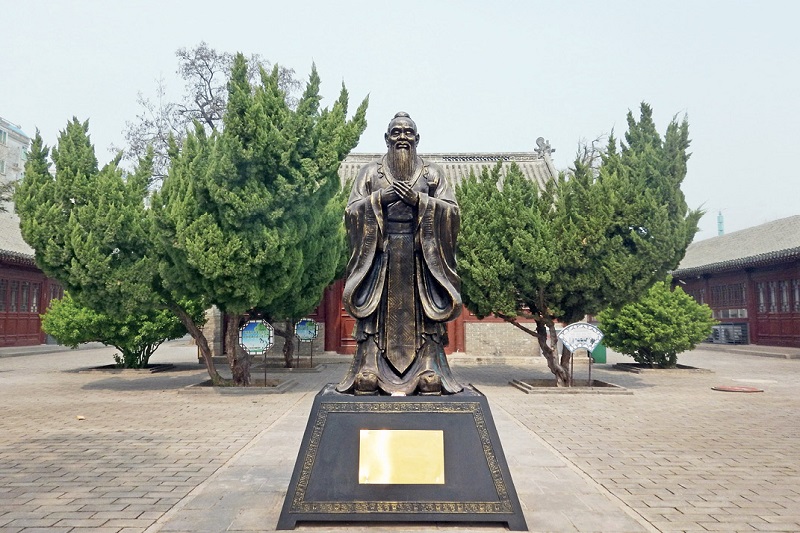
A statue of Confucius in the ancient town of Zhengding, Shijiazhuang City in Hebei Province.
The adage “实事求是 (shi shi qiu shi),” which means “seeking truth from facts,” can be traced back to a chapter about Liu De, son of Western Han (206 B.C.-24 A.D.) Emperor Liu Qi, in the first-century classic the Book of Han. The prince was often engrossed in studying Confucian works and did extensive research to clarify the truth about past events since many historical records had been destroyed amidst the wars of the late Qin Dynasty (221-206 B.C.), which preceded Han. To preserve the remaining ones, Liu De devoted his life to their collection, assortment, and research. He was very rigorous in carrying out his mission. For the books with missing pages, disputed sections or different editions, he brought together erudite scholars to discuss and analyze them. Then based on their discussions, he would make corrections and eventually compile them into volumes. Thanks to his efforts, a large number of ancient classics were revived. This is why Ban Gu (32-92 A.D.), a historian of the Eastern Han Dynasty, wrote his biography in the Book of Han, praising him as “a diligent scholar devoted to studying ancient classics and seeking truth from facts.”
“Seek truth from facts” has since been hailed as the right attitude for pursuing academic study. Despite being well-versed in the ritual rules of the Xia and Shang dynasties (about 2070-1046 B.C.), Confucius held back from commenting on them because he could not verify them through existing classics or descendants of Xia and Shang.
This academic rigor was shared by other renowned scholars, such as Liu De of the Han Dynasty, Yan Shigu (581-645) of the Tang Dynasty, Zhu Xi (1130-1200) of the Song Dynasty, Wang Yangming (1472-1529) of the Ming Dynasty, and Gu Yanwu (1613-1682) of the Qing Dynasty, all of whom underscored that true knowledge comes from hard facts. Gradually, the ideology of “seeking truth from facts” was embraced by more people as a daily motto to live by and a principle of state governance that emperors should follow.
Deeply rooted in traditional Chinese culture, “seeking truth from facts” has been revered as the right approach to dealing with inter-personal relations and other matters in life. The Analects of Confucius records a conversation between Confucius and his disciples. When asked by one of his disciples named Zi Lu if he should immediately apply a teaching he had just learned, Confucius said, “You have a father and older brother to consult. What’s the rush to put it into practice?” Another disciple Ran You asked the same question on another occasion, to which Confucius advised, “You should apply it immediately.” Listening to Confucius’s responses, another disciple Gongxi Hua was confused, and asked the master why he gave different answers to the same question. Confucius explained, “Ran You has a tendency to give up easily, so I encouraged him to act more, whereas Zi Lu is a daredevil, so I encouraged him to apply what he learned slowly.”
Like tailoring teaching methods to each student’s personality as Confucius did, we should make life decisions based on real situations. To stay on the right path in an ever-changing world, we need to maintain honesty and be committed to what is true.
“Seeking truth from facts” is also a valuable principle that can be applied in state governance. Throughout its history, the Communist Party of China (CPC) has adapted the basic tenets of Marxism to China’s specific conditions. In the process of blazing a trail for the Chinese revolution, Mao Zedong gave a new meaning to “seeking truth from facts.” When giving his speech “Reform Our Study” in Yan’an in 1941, he said, “‘Facts’ are all the things that exist objectively, ‘truth’ means their internal relations, that is, the laws governing them, and ‘to seek’ means to study. We should proceed from the actual conditions inside and outside the country, the province, county or district, and derive from them, as our guide to action, laws which are inherent in them and not imaginary, that is, we should find the internal relations of the events occurring around us.”
Our past experiences have proved that conformity to this principle is key to the success of all undertakings of the CPC and the state. For a period after the founding of the People’s Republic of China, China made missteps and suffered setbacks as a result, primarily because it became detached from the reality that it was still in the primary stage of socialism.
Having learned a bitter lesson, China reinstated the fine tradition of “seeking truth from facts” after the Third Plenary Session of the 11th CPC Central Committee under the leadership of Deng Xiaoping. Known as a truth seeker, Deng initiated the reform and opening-up policy, stressing that countries should choose their own paths suitable for their specific features and conditions.
Starting as a maxim for academicians in ancient China, “seeking truth from facts” has evolved into a fundamental guiding principle of the CPC. This evolution exemplifies the continuation and innovation of the Chinese civilization. Being a way of thinking rooted in Mao Zedong Thought, Deng Xiaoping Theory, and Xi Jinping Thought on Socialism with Chinese Characteristics for a New Era as well, it has guided the CPC in winning the revolution, founding a socialist country and advancing reform and opening-up with the support of the people.
President Xi Jinping once said that all China’s achievements in the past can be attributed to its tradition of seeking truth from facts. Facing new situations and new challenges in the new era, the country must carry forward this tradition, fine-tune its policies according to changes in domestic and international situations, further reform in all aspects, and improve its governance model. In advancing Chinese modernization, it is marching toward the goal of national rejuvenation. 
SONG ZHENZHONG is a researcher with the China Confucius Research Institute.